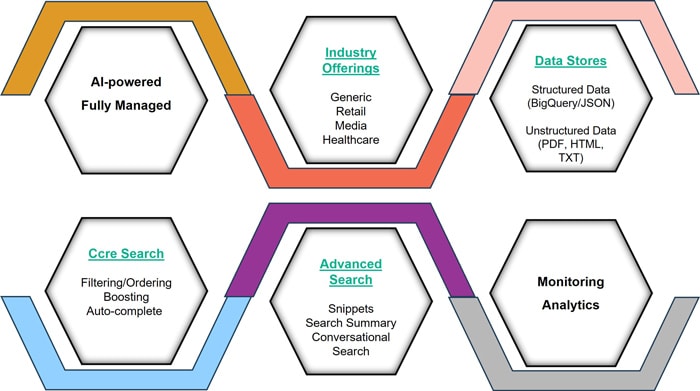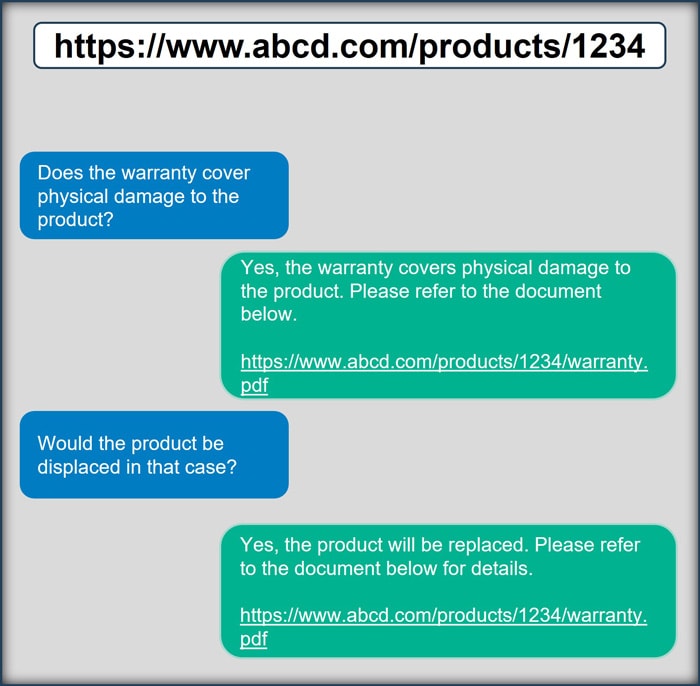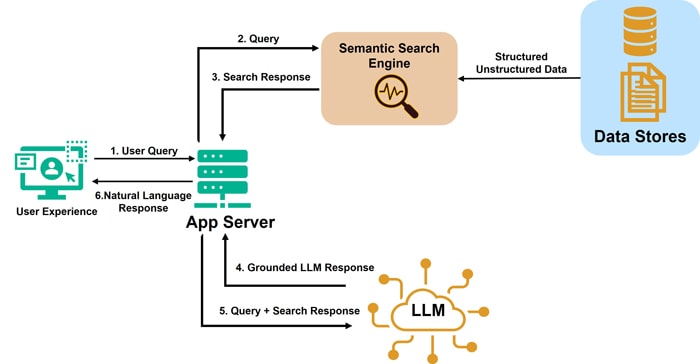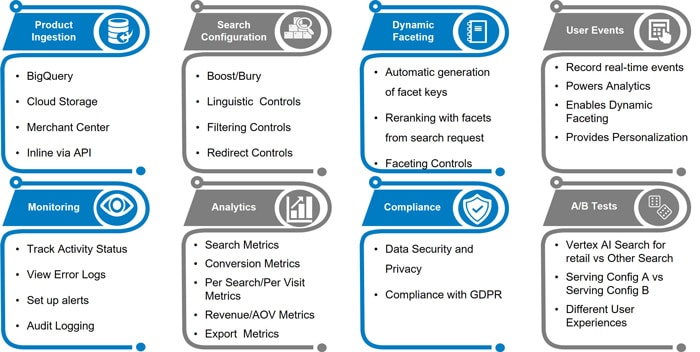Experience
Vertex AI Search in e-commerce
This white paper explores the transformative potential of Vertex AI Search, an AI-powered semantic search engine, to enhance the search capabilities of e-commerce applications.
Insights
- This white paper provides readers with insights into the potential benefits e-commerce applications can reap from semantic search engines.
- It further delves into the features and capabilities of Vertex AI Search platform and how it can help realize various search requirements in e-commerce applications.
Introduction
Search is undeniably a critical feature of an e-commerce application and plays a key role in product discovery. Rising customer expectations compel businesses to deliver a seamless, efficient and personalized search experience. Search technology has made huge strides over the years driven largely by advancements in Artificial Intelligence and Machine Learning. Leveraging decades of experience in search technology, Google has launched an AI-powered search platform – Vertex AI Search, for enterprise apps. While Vertex AI Search offers search, recommendations and industry-specific offerings, this paper focuses mainly on Generic Search and Vertex AI Search for retail.
An e-commerce application should have a robust search function that allows users to find products they are looking for, easily and quickly. Enhanced product discovery leads to increased conversions and reduces the number of abandoned carts. Analyzing search queries provides insights into customer preferences and trends. Apart from products, some e-commerce applications allow users to search for website content such as FAQs, refund and return policies etc.

Evolution of Search Technology
Search technology has evolved over the years, from the basic keyword-matching search to the AI-powered contextualized and natural language search, known as semantic search. E-commerce businesses, over the years, have employed keyword-based search engines to help users find products. However, they are increasingly turning to semantic search engines to provide an AI-enabled search experience and improve product discoverability.
Lexical Search
Traditionally, search engines have relied on lexical search to find content that matches a user’s query. Lexical search, often referred to as keyword-based search, looks for documents that have the exact words and phrases contained in the query. In lexical search, typically, documents are ranked based on the number of exact keyword matches – it uses term frequency (TF), inverse document frequency (IDF), proximity of keywords and other factors to calculate the relevance of a document to the query. While these search engines are simple and fast, and excel at finding documents with exact terms, they lack the ability to comprehend the intent of user. Many a time, users do not key in the exact words present in the documents. A keyword-based search engine tends to have a lower recall for such search queries. Lucene that powers Solr and Elasticsearch is a popular keyword-based search engine.
Semantic Search
Semantic search has now surged to prominence owing to its ability to provide personalized and contextualized search results by understanding user intent, and thus improving online search experience significantly. With advancements in Natural Language Processing (NLP) and Machine Learning (ML) technologies, semantic search has experienced a significant evolution and seen widespread adoption. Unlike traditional search engines, semantic search engines, powered by vector search, take user intent and context into account and provide more accurate search results and rank them in the order of intent and context relevance. Vertex AI Search, Algolia, Bloomreach are some of the popular semantic search engines.
Hybrid Search
While semantic search engines are good at finding semantically similar content, they may not be effective in a few scenarios. For instance, a B2B user may often search for products with their Ids (e.g.: vehicle part numbers). Also, industries such as finance, manufacturing and healthcare have content with specialized jargon and is difficult to match semantically. A keyword-based search engine will be a better tool for such business use cases. Some search engines support hybrid search by complementing the capabilities of semantic search with those of keyword-based search.
Vertex AI Search

Vertex AI Search is a part of Vertex AI Agent Builder. It is a fully managed search platform that leverages the power of AI to provide advanced search capabilities. It excels at understanding natural language queries, retrieving relevant information from various data sources, and delivering precise search results for both structured and unstructured content.
Along with Generic Search, Vertex AI Search offers the following industry specific solutions -
- Vertex AI Search for retail
- Vertex AI Search for media
- Vertex AI Search for healthcare and life sciences
With Vertex AI Agent Builder, a search application can be quickly created and integrated into an e-commerce application using search widget. It involves simple steps of creating a search application via the console and associating it with a data store. Agent Builder supports different types of data stores including website data (crawled web pages), structured data (BigQuery, JSON) and unstructured data (HTML, PDF, TXT etc.).
Features
Apart from the standard search engine capabilities such as autocomplete, filtering, boosting and ordering, Vertex AI Search boasts the below advanced LLM features.
- Search snippets/extracts: Vertex AI Search generates a brief snippet or extract, along with hit highlighting, from the search result content to help users get an overview of the search result.
- Search summary: Google has recently launched a new search feature AI Overview wherein a brief AI-generated summary of the topic/subject is provided at the top of search results page in response to a user’s query. This helps users get a quick overview of the search response. Vertex AI Search, using its underlying LLMs, can generate a similar summary of search results, along with citations. The summary is responsibly generated by LLMs, with no hallucinations, since it is grounded in the enterprise content uploaded to the platform.
- Conversational search: This feature allows users to ask follow-up questions (multi-turn) in a conversational manner. Vertex AI Search holds the context of previous queries and responses in a search session and provides context-aware answers. User queries are re-phrased, synthesized and simplified to fetch the most relevant answers.
E-Commerce Use Cases
Outlined below are some of the e-commerce use cases that can be realized using the capabilities of Vertex AI Search.
Product Inquiry
In automotive, electronics and some other industries, products usually have a lot of additional information that needs to be provided to online customers. This may include user manuals, safety instructions, warranty details among others. This data is usually made available online to customers via PDF files. Having to painstakingly read through all the documents to find a specific piece of information may put off customers.

Vertex AI Agent Builder can help address this business use case by creating a search application with a data store that holds unstructured data (PDF files). Through Google Cloud Storage, the product PDF files can be indexed to Vertex AI Search. Metadata, in JSON, can be added to these files that will help filter them while performing a search. Product Id, category (manual, warranty) can be added as the metadata.
Using the answer method of Vertex AI Search API, user query can be run against the indexed files. A filter on product Id will narrow down the search to only the files belonging to the product the user is interested in. Vertex AI Search leverages underlying LLMs to generate an answer from the search results fetched by the search engine. answer method holds the search context and answers follow-up questions, if any. Adding citations to the response will provide users with references to the original documents.
Content Search
E-commerce customers expect to find general information just as quickly and easily as they do products. This may include FAQs on various topics such as delivery, payment, refund/return policies, to name a few. A marketplace may have content that contain seller information and their policies. A furniture retailer may have featured pages that provide ideas to enhance the interior design of a house with the right assortment of their products. Customers should be able to easily find these pages by running a simple query.
With Vertex AI Search, website data can be indexed and queried. URLs of web pages (e.g.: www.abcd.com/faq/, www.abcd.com/featured/) can be provided while creating the data store, which will be crawled and indexed. When user submits a query, each search result will have a matching extract from the page, along with a reference to the URL of the page.
Retrieval Augmented Generation
Large language models (LLM) may hallucinate, i.e., provide inaccurate responses, since their knowledge is limited to the pre-trained data. LLMs do not have up-to-date information, nor do they have access to an enterprise’s private data, rendering them unsuitable for most practical applications. Grounding the responses of an LLM in external data sources can help solve the problem. With Retrieval Augmented Generation, an information retrieval system will fetch the data from an external source and feed it to an LLM which provides an accurate answer.
Vertex AI Search can function as an information retrieval system when building an app with Generative AI on Vertex AI. Responses of Vertex AI models can be grounded in the enterprise documents from Vertex AI Search data stores. This architecture can help realize many e-commerce search use cases. For instance, Content Search described above can be implemented with Gemini on Vertex AI as LLM and Vertex AI Search as its information retrieval system.

Vertex AI Search for retail
Vertex AI Search for retail is an industry specific offering tailored to meet the needs of retail e-commerce businesses. Online retailers stand to benefit immensely from its semantic search, personalization, extensibility and availability of connectors with other Google services. These capabilities enhance search experience, drive engagement and improve conversions. It is a fully managed search platform with support for multiple languages. Vertex AI Search for retail comes shipped with a pre-defined retail schema which can be extended as per the needs of a business. With strong security and privacy controls in place, the platform can support compliance with regulations such as GDPR.

Product Ingestion
Products can be ingested into the platform through Merchant Center, BigQuery, Cloud Storage and inline via API. Data Quality page in the search console provides an overview of the quality of the product data ingested.
Search Configuration
Serving controls allow configuring search behavior. Merchandisers can push certain products up or down the search results order using boost/bury control. They can redirect customers to specific pages based on the search term. For example, customers can be redirected to FAQ page when they search for policies etc. Linguistic controls allow merchandisers to configure synonyms, ignore and replace terms.
User Events
Capturing user events is crucial to improving and measuring the overall search performance. User events such as - search, product details page view, add to cart, purchase complete - need to be recorded in real time. They help in understanding overall search trends and personalizing search results. User events also power autocomplete and dynamic faceting features.
Retailers looking to migrate to Vertex AI search for retail can load historical user event data from their Google Analytics platform and hit the road running.
Dynamic Faceting
Faceting allows users to filter search results and is a key feature of any search engine. Most search engines allow static configuration of facets or passing them in the search request. The application decides what facets need to be displayed and their order. This may result in presenting irrelevant facets to users that they may not engage with. With dynamic faceting, Vertex AI Search for retail includes facets dynamically in the response based on the user behavior and facet clicks. The order of facets and facet values is also determined dynamically. This enhances the engagement rate of facets. In addition, facet controls allow merchandisers to remove facets, ignore, merge or replace facets values.
Measuring Search Performance
Search analytics is critical to understanding the performance of the search engine. Businesses would want to measure how their search function is performing in terms of click-through rates, conversions and various other metrics. Vertex AI Search for retail captures user events to generate analytics. It generates an attribute token in each search response, which should be made part of subsequent user events. This helps attributing user actions to a particular search and aids in improving search re-ranking and measuring search performance.
Vertex AI Search for retail comes with an analytics dashboard that presents various search metrics. Businesses can view the number of searches performed on their website, how many of them resulted in a click-through and eventually got converted. They can also view other metrics such as purchase rate per search and average revenue generated per search.
Conclusion
E-commerce businesses that adopt semantic search and integrate advanced search features such as AI Search Overview, Conversational Search into their applications will differentiate themselves from competitors and attract more customers. As NLP technology continues to advance, we can anticipate even more sophisticated and intuitive search experiences, transforming the way e-commerce customers discover products and content.
References

Subscribe
To keep yourself updated on the latest technology and industry trends subscribe to the Infosys Knowledge Institute's publications
Count me in!









